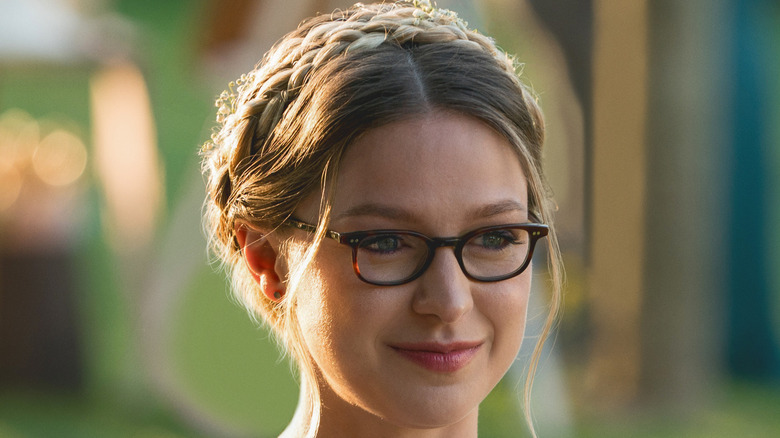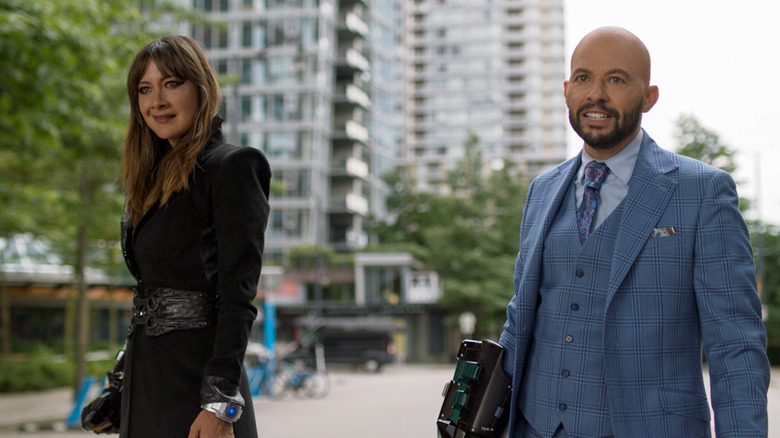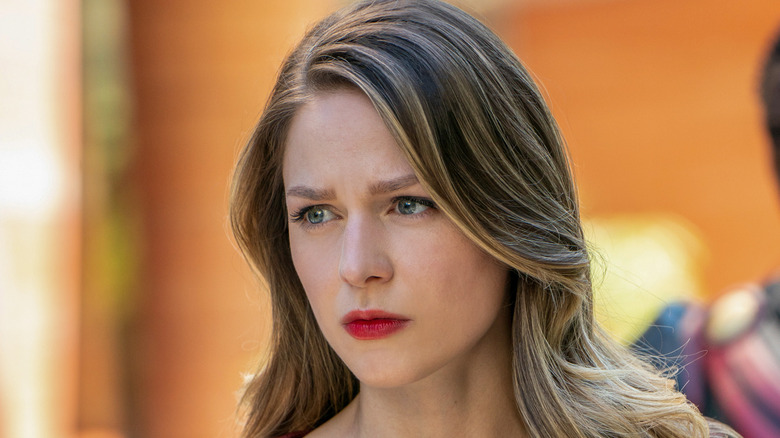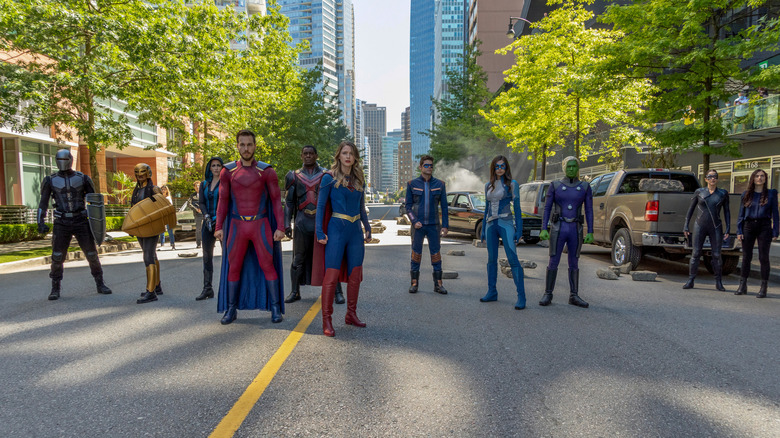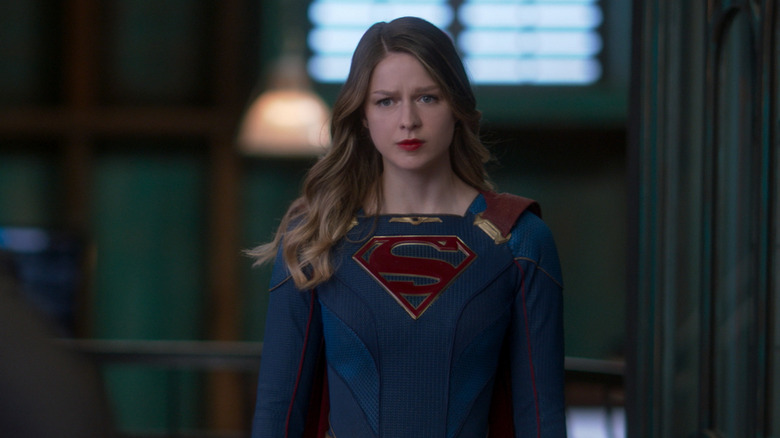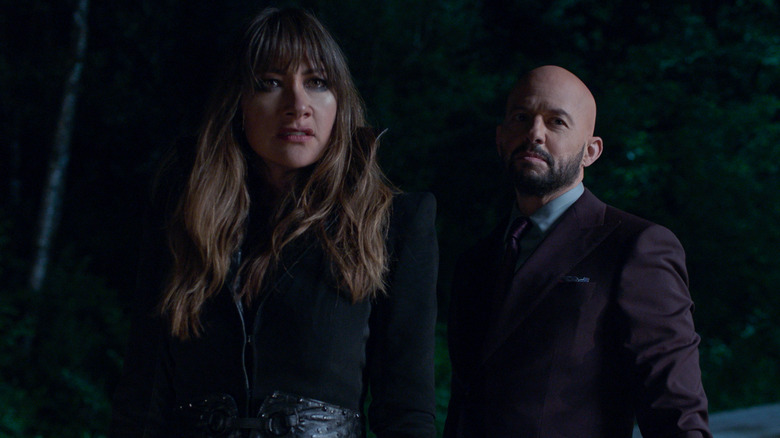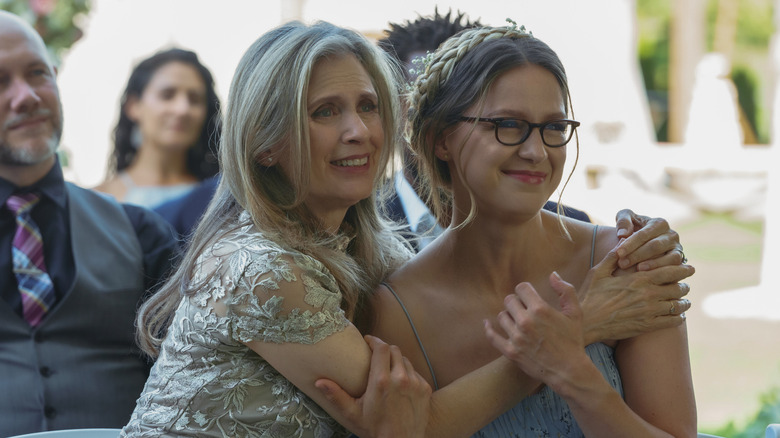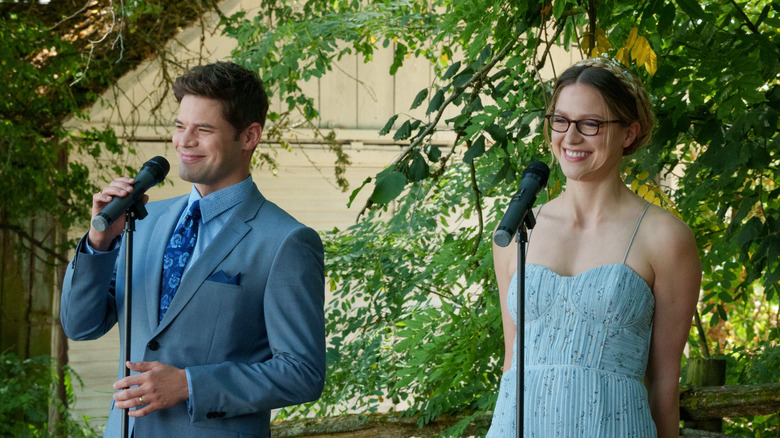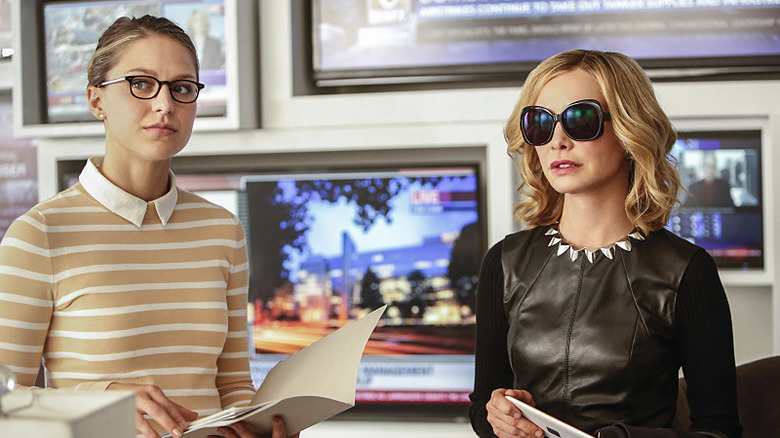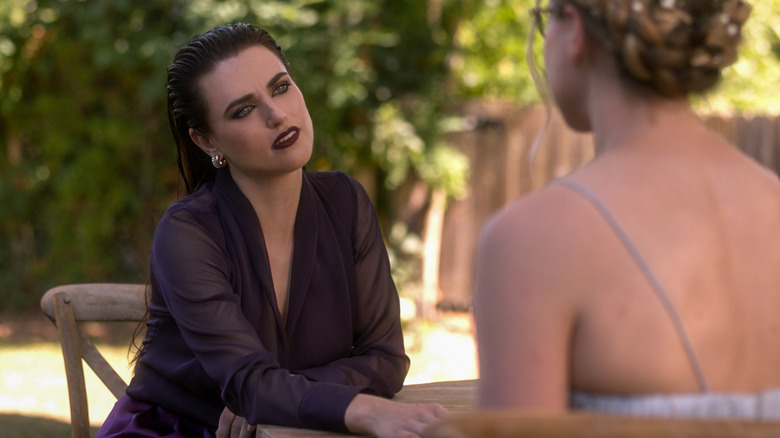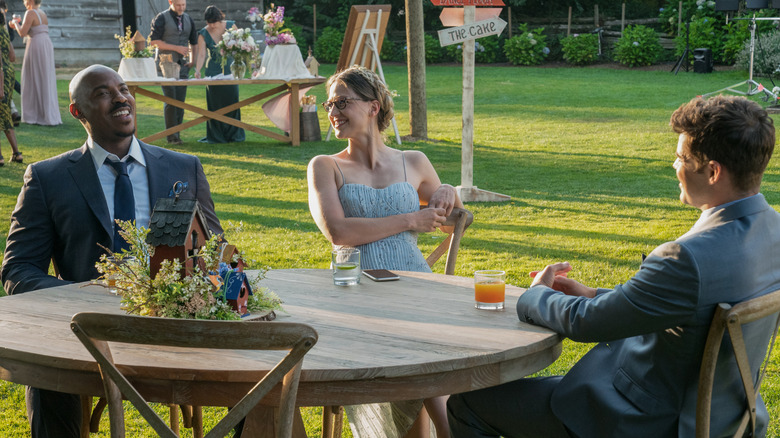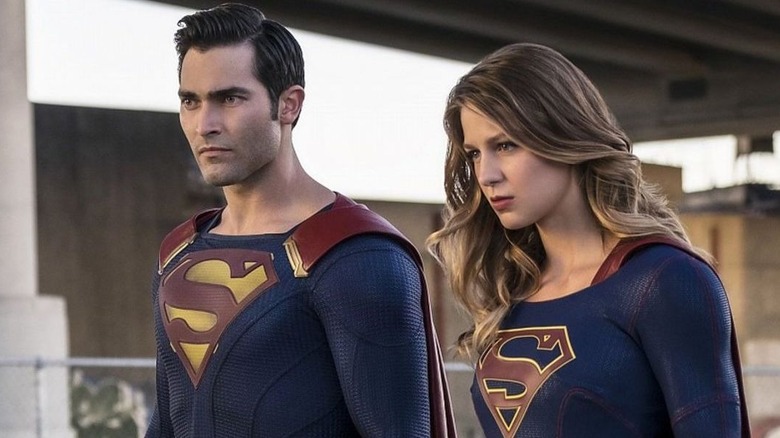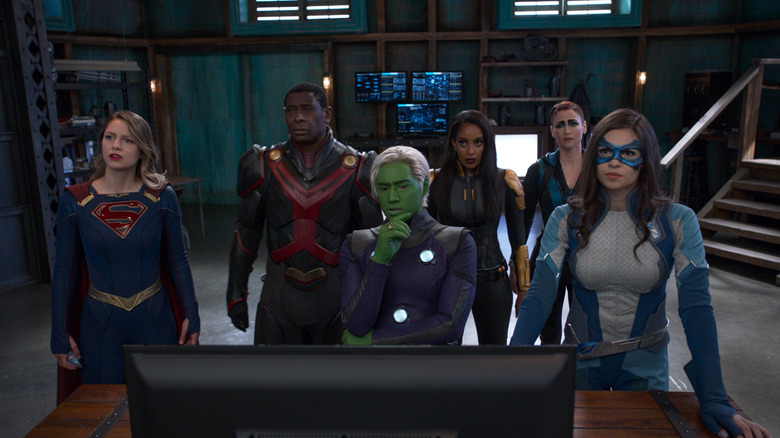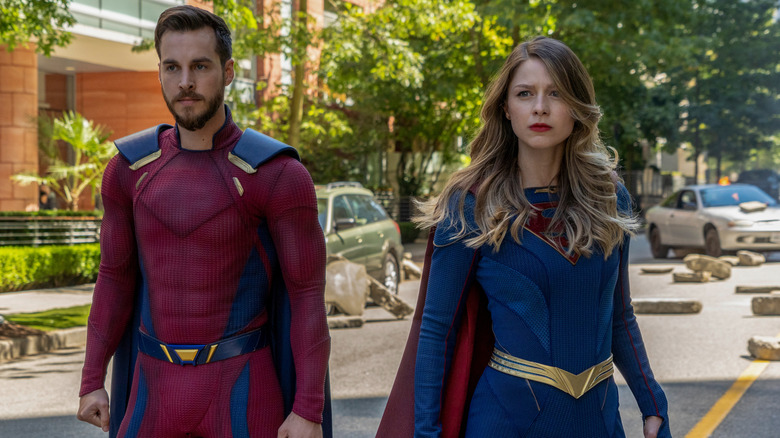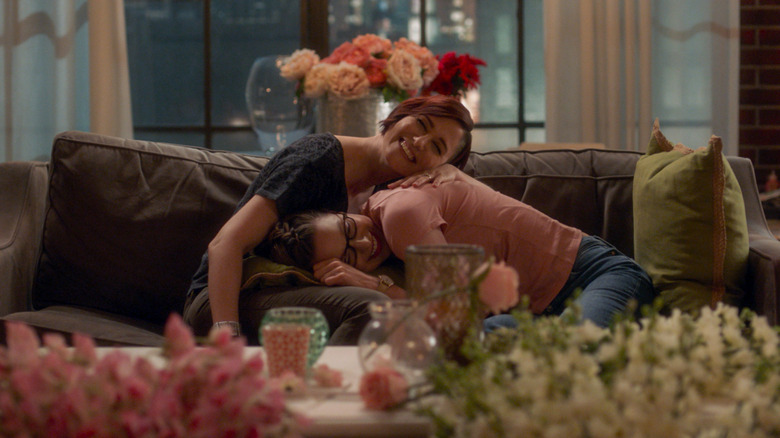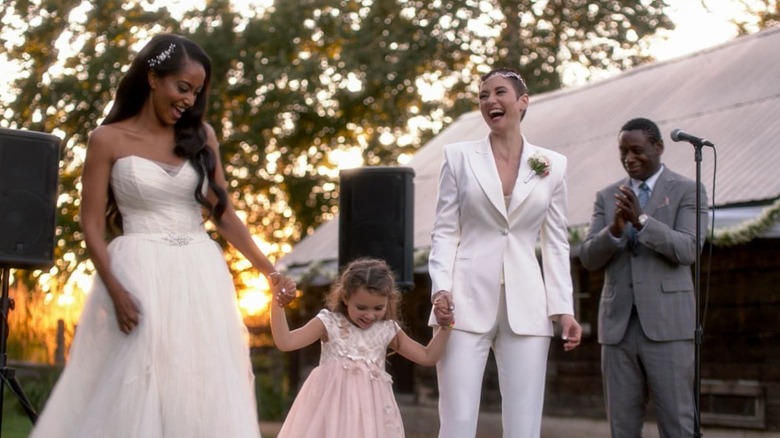The Ending Of Supergirl Explained
In 2015, "Supergirl" flew onto the airwaves on the heels of successful shows like "Arrow," "Gotham," and "The Flash." Though Supergirl herself imparted hope during the series every week, fans lost their own when cancellation loomed on the horizon. Given all of the DC-derived Arrowverse shows on the CW, it was strange that "Supergirl" debuted on CBS, but the CW quickly swooped it up and gave it enough stability to attract the longtime audience that's lasted throughout the show's six seasons.
As main character Kara Danvers, aka Supergirl, has grown up and found herself, so have fans — and the decision to finally end the series came on an intentional note rather than a hasty cancellation. A preplanned ending is always ideal, giving writers a chance to close up integral storylines, nab a few series favorites who have since left the show, and go out with a bang — and closure. "Supergirl" managed to do all of those things and more in the final bittersweet season — including the last two episodes, aptly titled "The Final Gauntlet" and "Kara."
While some aspects of the ending are pretty self-explanatory, the final season — and especially the final few episodes — go deep into the psyche of our characters, Super Friends as well as foes. From dismantling secret identities to villainous self-destructions and an '80s reference you may or may not have missed, here's everything you need to know about the ending of "Supergirl."
From daddy issues to an inability to love
If Lex Luthor's obsessive plight to win Nyxly over made you super uncomfortable, you're not alone. In the final episodes leading up to the finale, we watch a future Lex flounder over his supposed love for the Fifth Dimensional nymph. But is it actually love? Absolutely not. When it comes to characters like Lex with absolutely no morals, obsession and love seem like one and the same. Sure, he makes a few sacrifices for Nyxly (like giving up the Love Totem to save her). However, even that is all in service of winning her over. At the end of the day, Lex can't love anyone more than he loves himself, and he'll burn the world down for one more self-aggrandized love poem to himself. How quickly he turns on his supposed love is proof of that.
Meanwhile, Nyxly shows glimmers of humanity when she refuses to let Lex harm Esme after kidnapping the newest Danvers daughter. Nyxly has a very pointed (and twisted) moral system, but she's still capable of empathy. Unlike Lex, the nymph still feels the need to belong — to be wanted. Her fraught relationship with her father homes in on that, and she even admits it when she gets the Truth Totem. Nyxly has all the power to be a good person. Yet her obsession with vengeance (that she calls justice) is too strong, and her abandonment issues allow Lex to manipulate her, if only for a minute. It leads to her downfall.
Playing god, then backing down
Both Kara Danvers and her alter ego Supergirl spend the entire show on a journey of self-discovery. Who exactly is this girl from Krypton? How does she fit into the human world? And more importantly, how can she marry both parts of herself to feel like a whole person? Those philosophical musings become too much for our hero to handle in the final season.
Kara's identity begins to fragment and pull her apart, and she loses sight of her optimism and hope. She falters at CatCo duties, and she's letting things slip as Supergirl. Our girl is overwhelmed and running on fumes after five-plus years of living two lives with no break. So when Supergirl sees an easy out, a simple way to make the villains go away, she jumps at the chance. Going against Lena's pleas for her to rethink sucking up the sun's energy for six whole months, Supergirl begins her power absorption — that is, until she hears a young girl's voice pleading with her to stop.
Instead of playing god and becoming the very villain she's sworn to protect the world from, Supergirl releases the sun's energy, bringing light back to National City — in more ways than one.
People become their own heroes
Supergirl's trip to the brink of the dark side is enough of a wake-up call for her to realize that she and the Super Friends can't go on like this. Heroes can easily become villains if they hold too much power. As Supergirl says, "Seizing power is what our enemies do. We're defined by our choices, and this is the wrong one."
Sometimes, you have to give a bit of the power back to the people and trust that they'll do what needs to happen. After Esme breaks the AllStone, Lex and Nyxly's city-wide battle drains humanity into shells of their former selves. Meanwhile, Orlando's rallying speech inspires Supergirl's most unforgettable moment yet. The penultimate episode ends with Supergirl saying she knows what to do, leading into the finale.
A rallying cry across space and time
Kicking off the finale, as the AllStone deprives humans of their humanity, Supergirl plants a message in everyone's mind with the help of Lena's newfound magic skills. It's a bit weird that people immediately identify the voice as Supergirl's — no one bats an eye when Kara speaks. But when Supergirl tells humanity to reclaim their power, she's also talking to herself — the Kara inside of her. She takes her own words to heart when she says, "When each of us contributes our own unique gifts to the world with a full heart, together we will shine."
And from this point on, Supergirl is never the same. Mon-El claims that her speech ripples through history, and this becomes the most essential battle she's waged. There's no grand fight sequence or wild special effects, but like Kara, Supergirl uses her words to inspire hope in humanity and allow people to become their own heroes. From this point on, the people don't need Supergirl as much, and that's not exactly a bad thing. Sure, things aren't perfect, but they're looking up. And according to Mon-El, that rally cry makes enough of an impact to extend past even Supergirl's own lifetime. That is, if Winn stops screwing around with the sanctity of the timeline by teasing future information to the Super Friends.
Villains are their own worst enemies
Fans might view Lex and Nyxly's defeat as a bit anticlimactic, but it's one of the most awe-inspiring takedowns in the show — because the villains defeat themselves. As Brainy notes, "There's no greater cover for fear than hubris," and that's precisely what leads to Lex and Nyxly's downfall as they square off against the Super Friends and everyone Supergirl inspired in National City.
When you have as much power as a supervillain, your entire existence hinges on two things: acquiring more and making sure you don't lose it. One of the main reasons neither Lex nor Nyxly can truly love is their mistrust that stems from this eternal fear of losing power. By loving someone, you give up a lot of power and independence. That person's needs become just as important, or more, as your own.
Villains thirsty for control, they can never ditch that fear of losing it long enough to ever truly put someone else first. After Lex calls forth the Phantom Zone, the escaped phantoms immediately come to claim their prize, as Nyxly and Lex's collective fear makes for a nice treat. Let's just hope that someone kept Nyxly's Phantom Zone digs warm, because she's heading right back where she belongs. Except this time? She has a plus one — and if the phantoms don't kill Lex and Nyxly, they just might kill each other.
From Supergirl to Supergirl
The "Supergirl" finale makes the right choice to end the final battle in under 14 minutes, leaving plenty of time to focus on character relationships, Will's funeral, Alex and Kelly's wedding, and the future of CatCo. When it comes to the final battle, most cameos from fan favorites like Jeremy Jordan (Winn) and Mehcad Brooks (James) are pretty short and a bit superficial.
Of course, they're there for the villain takedown, but the villains take themselves down, so there's really not much for anyone to do. Given how mixed the fandom has been about Mon-El's romance with Kara, the writers keep his arc short and sweet, with the promise that this will be his last tryst in Supergirl's timeline.
Winn and James are there for the wedding and some long overdue Super Friends bonding, and it's just what the fandom needed to say goodbye. Eliza is also present for the wedding — Alex is her daughter, after all. But if fans of the series ever checked out the '80s "Supergirl" movie, they might notice someone familiar: Helen Slater, the original Supergirl, plays Eliza as a fun little Easter egg that the show references with her pre-battle line "You'd think in another life I was a Kryptonian." Of course, Alex claps back with "Only in the movies."
Cameos that mean something
Fans were a bit upset that the musical Arrowverse crossover in Season 3 focused way too much on "The Flash" and barely gave Melissa Benoist and Jeremy Jordan time to show off their impressive pipes. Three years later, the "Supergirl" writers gave us one last gift to remedy that: a duet between Winn and Kara performing a gorgeous rendition of Pat Benatar's "We Belong" when Alex and Kelly walk down the aisle during their wedding. If no tears were shed at this moment, you just might be Lex Luthor.
Whether J'onn's "Wow, just wow" is meant for Kara and Winn or the wedding itself is unclear, but let's just go with both. Both is good. It's crucial that so much space is reserved for the wedding, given how rare lesbian weddings are on TV, but it also represents everything that "Supergirl" stands for: hope and love. So many shows end on a gut-wrenching note of despair (we're looking at you, "Arrow"). But that was never "Supergirl." Supergirl's optimism and light have seeped into the show's DNA since the premiere, and the finale honors that instead of trying to up the ante with wild plotlines and fight scenes. And if Winn and Kara's duet wasn't enough to make you cry, or the one final OG Super Friends hangout, James giving his niece Esme an old camera should do the trick.
A new era of CatCo
Once Supergirl empowers the people of National City to control their own destiny, she isn't needed as much. When civilians don't even need her to save a cat from a tree, she has a bit of an identity crisis. Yet there's a very different Cat who can help rescue Kara.
More than caped crusaders like Supergirl, National City needs more people like Kara — journalists with integrity who give hope and educate people about the causes and crusades they need to fight for themselves. And who better to drill that through Kara's head than Cat Grant? In all of her dramatic glory, we watch her scold Kara (more affectionately known as Kira) for her aimlessness. Fans weren't expecting Calista Flockhart to show up, given that the show films in Vancouver, and Flockhart exited after the network change due to her L.A. location. Yet we never really see the duo in the same space, so Flockhart could easily have filmed her phone calls from California.
From Cat's very first words in the finale about despising people, fans fly right back to Season 1 nostalgia. She offers Kara a new role as editor-in-chief when she announces her repurchase of CatCo, ensuring Kara that "There's no tool more powerful for change than the press." Revealing that she's known Kara's secret identity all along, she leaves her with one thought: "Secrecy is the badge of fraud." This truth bomb changes everything.
So what's the deal with SuperCorp?
Going into the finale, many fans had one question: would the Kara and Lena relationship shipped as SuperCorp become canon? Well, their social media status seems to be "It's complicated." For years, fans have railed against the show for queerbaiting Lena and Kara with nuggets of relationship-esque scenes that never got past implication. The CW's "Supernatural" also faced similar backlash when the show ended, though there are no love confessions between Kara and Lena — platonic or otherwise.
When photos of the finale were released, fans speculated that Lena was holding Kara's hand in the picture of them chatting at the wedding. As it turns out, it's just carefully placed camera work; Lena's hand wasn't touching Kara's at all. There's certainly the possibility that the show was stringing SuperCorp fans along to hype them up for the finale, but the scene is still incredibly vulnerable, touching, and intimate.
There's something to be said about Kara being inspired to remove her glasses not by her mentor Cat Grant, but by Lena, who admits, "Maybe we did have a bit of a bumpy road." Lena convinces Kara to be exactly who she is without hiding, and Kara says, "Of all the friends I have ever had, you have pushed me the most — challenged me the most." Lena's response tugs on all of the heartstrings: "You've made me a better person. Thank you." So ... SuperCorp isn't canon, but it's not not canon either.
No more double vision
Now that Kara has decided to ditch her glasses for good, her life looks different — because CatCo ace reporter Kara Danvers and National City's hero Supergirl are now publicly one and the same. This decision, while empowering for our fractured heroine, also leaves a whole lot of questions and uncertainties in its wake. The two biggest concerns are Kara's ability to do her job as a journalist when people know she's a hero and the risked safety that comes along with people knowing your secret identity.
Lena addresses the latter when she says that they'll come for anyone who tries to mess with this family, but those are merely pretty words. Nyxly and Lex may be gone for the time being, but that doesn't mean there won't be a more powerful villain that pops up the next day. It's easy to make this choice in a calm moment, but what happens when another villain kidnaps Esme to get to Supergirl? Because it will happen — superfriends or no superfriends. Heroes don't have secret identities for no reason, and Kara isn't the first to put on a mask. And despite her personal journey, she won't be the last, either.
What this means for Clark
Speaking of heroes who maintain their secret identity, Kara's cousin is Clark Kent by day and Superman by night. How else could he keep his family safe and be an effective reporter? Clark laid the blueprint for Supergirl's life. And while her new path is necessary for her happiness and mental health, it's difficult to see how it won't affect her life as a journalist.
When she's trying to conduct interviews as Kara Danvers and people know she's Supergirl, the focus will undoubtedly shift from whatever important topic she's trying to uncover. How can someone speak on climate change or prison reform when they know a superhero is interviewing them? Will they be as truthful with Supergirl as they are with Kara? These would be fascinating ideas to explore had this choice developed at the beginning of the season instead of the end. Still, Cat Grant announcing Kara's new editor-in-chief title takes the show full circle in a lovely way.
But what exactly does this mean for our favorite Smallville crew over on "Superman & Lois"? Kara makes it no secret that Clark is her cousin, and Supergirl makes it abundantly clear that Superman is her cousin. Given their identical career choices, it doesn't take Lois Lane to figure out the connection — especially after Kara unmasks herself to the world. By revealing her own identity, she risks her cousin's, too. While this likely won't bleed into the Superman spinoff, it's hard to ignore.
Time to let our heroes rest
We don't typically appreciate our favorite superheroes' sacrifices when they give up their autonomy over their own lives. It's just accepted and expected that they never seem to get a day off. The "Supergirl" finale touches on this issue, letting our faves live for more than just saving people. This is particularly true for Brainy, who ditches his predetermined destiny to be with Dreamer. All iterations of Brainiac exist because the Big Brain does, but still, he rejects fusing with the Big Brain to save it (despite the complications that could arise for him and his race). Brainy does the right thing for him. He notes that the pursuit of heroism feels hollow without love, and that's something more superheroes should embrace.
After Nia catches the bouquet at the wedding, instead of being that guy — you know, the one who balks when tangible commitment is thrust in his face — Brainy smiles and says, "There is a 100% chance that Nia and I will be getting married." Well, Brainy, there's also a 100% chance that you are the most adorable Coluan that ever existed throughout time.
Now that Supergirl has empowered the people of the world to have more conviction and drive to fight their own battles, her new freedom gives her more time to spend game nights with her family, report on issues that matter to her, and maybe even find some love for herself.
Thirty, flirty, and super (single)
When it comes to our favorite heroes (especially women), there tends to be a need to have them partnered up constantly. During its run, "Supergirl" has defied this trope, letting Kara remain single and happy. Much of the fandom's negative reaction to her coupling with Mon-El back in Season 2 might have a lot to do with that. Cue Chris Wood's return to the series for the finale and some of the fandom's worry that the show would thrust them back together somehow.
Luckily, the series stuck to its roots instead of trying to throw Kara together with anyone — old or new — at the eleventh hour. All in all, it's always a brave choice for a show to let its women be single. Kara's focus has rarely been on love or dating, but that has the potential to change now that her load as Supergirl is substantially light. And though it seems like Mon-El won't return, fans of either "Supergirl" ship can come up with their own headcanons.
So, what's next for the superfriends?
In typical "Supergirl" fashion, the finale teases bright futures for all of its characters. In many cases, some of their greatest achievements have nothing to do with donning a cape and saving the world. There's more than one way to save the universe, and the Super Friends have found just about all of them. Following Will's gut-wrenching funeral after the major battle, we see a flash forward of some of the characters' future endeavors. Most touchingly, Andrea Rojas unveils a sign that reads "Esquela De Periodismo William Dey," or "William Dey's School of Journalism." This is particularly moving seeing as Andrea's own unethical journalism practices led to Will's death. Nothing can make up for that, but honoring his conviction and life's work is a start.
Additionally, Lena Luthor gets to reclaim her identity by renaming her Luthor Foundation the Lena Luthor Foundation. It still honors her adoptive family maybe more than they deserve, but her accomplishments are not only her own — she has made them happen while her family actively tried to tear her down. She deserves ownership of her own accomplishments and she gets it.
Another moment that might bring tears to fans' eyes is Nia's Dreamer Center For LGBTQ Outreach. TV's first transgender superhero Nia Nall (Dreamer) knows firsthand what it's like to deal with LGBTQ+ hate crimes, having been at the center of one of the show's most powerful episodes, "Reality Bytes." Nia starting a foundation for kids like her is a beautiful moment.
The Danvers family
Alex, Kara, and J'onn have a lot on their plate with the formation of a new Department of Extra-normal Operations, but that still leaves them with plenty of time to be a family. The penultimate scene in the series centers on game night, leaving a warm and fuzzy reminder that no matter what is going on in the lives of the Super Friends, they always make time for each other. Alex and Kelly's storyline is particularly beautiful, as the eldest Danvers finally gets the family she's always wanted with Esme and Kelly. However, she still gets to keep her identity as a DEO legend and even returns to her superhero roots for the "Flash" crossover event "Armageddon."
As for Kelly, her storyline is integral to the series as a badass Black female superhero — something we haven't seen a lot of on TV or film. This show started as an optimistic feminist story, and it never strayed from its roots. And though it's over, the lessons Kara, Kelly, Alex, and Nia have taught viewers will last a lifetime — and longer — as they're seared in the pages of pop culture history forever.
